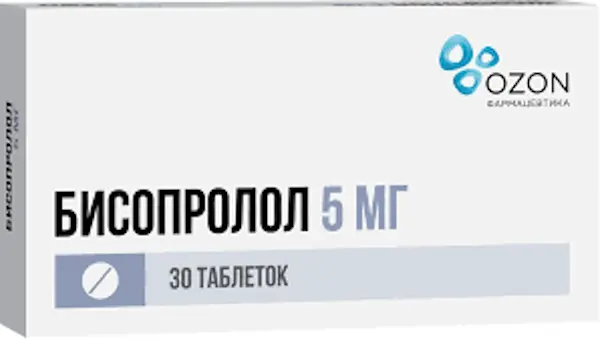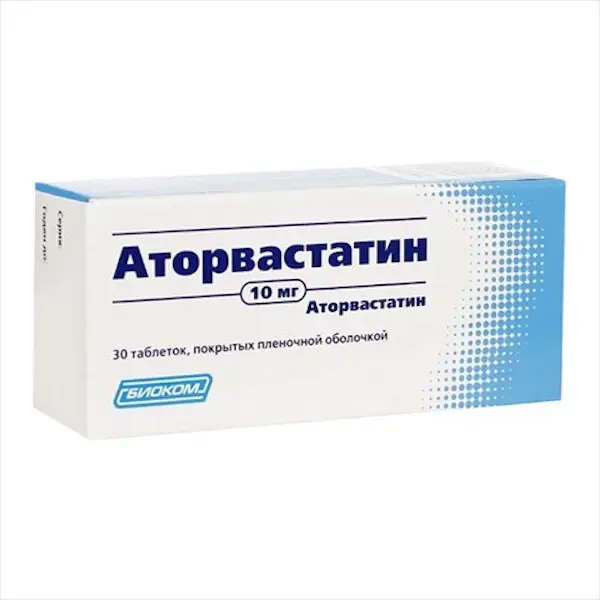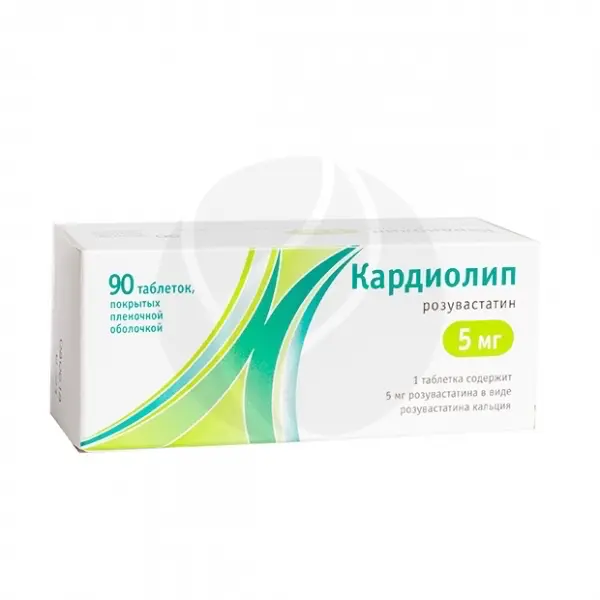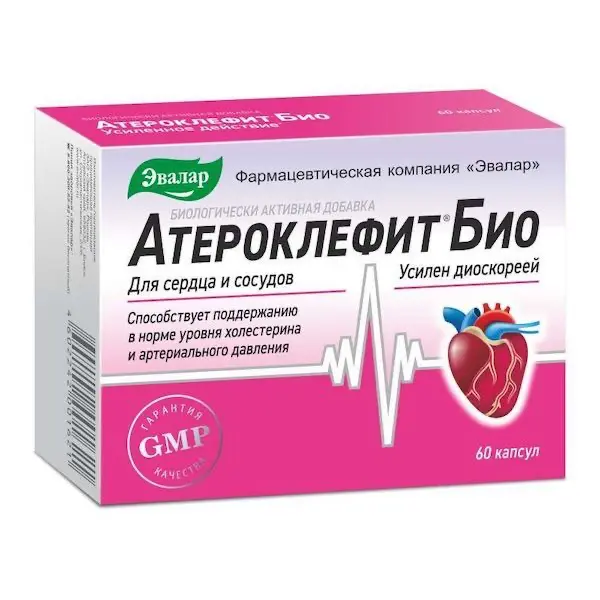Description
Bisoprolol Pharmacodynamics
A selective beta1-adrenoblocker, without sympathomimetic activity of its own, has no membrane stabilizing effect. Reduces blood plasma renin activity, reduces myocardial oxygen demand, reduces HR (at rest and under load).
It has hypotensive, antiarrhythmic and antianginal effects. In low doses, by blocking heart beta1-adrenoceptors, it decreases catecholamine-stimulated cAMP formation from ATP, decreases intracellular calcium ions flow, has negative chrono-, dromo-, batmo- and inotropic effects, inhibits myocardial conduction and excitability, reduces AV-conduction.
When increasing the dose above the therapeutic, it has a beta2-adrenoblocking effect.
HRPP increases at the beginning of drug use, in the first 24 hours (as a result of reciprocal increase of alpha-adrenoreceptors activity and elimination of beta2-adrenoreceptors stimulation), which returns to baseline value in 1-3 days, and it decreases with prolonged use.
The hypotensive effect is associated with a decrease in the minute blood volume, sympathetic stimulation of peripheral vessels, a decrease in the activity of renin-angiotensin system (it is important for patients with initial renin hypersecretion), recovery of sensitivity in response to BP reduction and the effect on CNS. In arterial hypertension the effect occurs in 2-5 days, stable effect – in 1-2 months.
Antianginal effect is caused by a decrease in myocardial oxygen demand as a result of decreased HR and contractility, prolongation of diastole, improvement of myocardial perfusion. By increasing left ventricular end-diastolic pressure and increasing ventricular muscle fiber stretch can increase oxygen demand, especially in patients with chronic heart failure.
Antiarrhythmic effect is caused by the elimination of arrhythmogenic factors (tachycardia, increased activity of sympathetic nervous system, increased content of CAMF, arterial hypertension), reduction of spontaneous excitation rate of sinus and ectopic pacemakers and AV conduction slowing (mainly in antegrade and, to a lesser extent, in retrograde direction via AV node) and along accessory pathways.
When used in medium therapeutic doses, unlike non-selective beta-adrenoblockers, it has less pronounced effect on the organs containing beta2-adrenoreceptors (pancreas, skeletal muscles, smooth muscle of peripheral arteries, bronchi and uterus) and on carbohydrate metabolism, does not cause retention of sodium ions (Na+) in the body; the intensity of atherogenic effect is not different from propranololol.
Indications
– Arterial hypertension;
– Coronary heart disease: prevention of angina attacks;
– Chronic heart failure.
Contraindications
– Hypersensitivity to bisoprolol, other drug components and other β-adrenoblockers;
– Acute heart failure or CHF in decompensation stage, requiring inotropic therapy;
– shock (including cardiogenic);
– pulmonary edema;
– Atrioventricular block (AV) of degree II-III, without a pacemaker;
– sinoatrial block;
– sinus node weakness syndrome;
– bradycardia (heart rate less than 60 bpm);
– severe arterial hypotension (systolic blood pressure (BP) 100 mm Hg);
– severe bronchial asthma and history of chronic obstructive pulmonary disease (COPD);
– Severe peripheral circulatory disorders, Raynaud’s syndrome;
– metabolic acidosis;
– pheochromocytoma (without concomitant use of α-adrenoblockers);
– concomitant use of monoamine oxidase inhibitors (MAO) (except MAO type B inhibitors);
– Under 18 years of age (efficacy and safety have not been established);
– Lactose intolerance, lactase deficiency or glucose-galactose malabsorption syndrome.
Caution:
Carrying out desensitizing therapy, Prinzmetal angina, hyperthyroidism, type 1 diabetes mellitus and diabetes mellitus with significant fluctuations in blood glucose concentration, grade I AV blockade, renal failure (CK less than 20 ml/min), marked liver function disorders, psoriasis, restrictive cardiomyopathy, congenital heart disease or heart valve defect with significant hemodynamic disturbances, CHF with myocardial infarction during last 3 months, strict diet, depression (including anamnesis), elderly age.
Pregnancy and lactation:
Bisoprolol has pharmacologic effects that may have detrimental effects on pregnancy and/or on the fetus or newborn. Typically, β-adrenoblockers decrease placental perfusion, which leads to fetal growth retardation, intrauterine fetal death, miscarriage, or preterm birth. The fetus and the newborn child may have abnormal reactions (e.g., hypoglycemia, bradycardia, arterial hypotension).
Bisoprolol should not be used during pregnancy, the use is possible if the benefit to the mother exceeds the risk of side effects in the fetus and/or child. When treatment with Bisoprolol is considered necessary, uteroplacental blood flow and intrauterine development of the fetus should be monitored. Alternative therapy should be considered if the pregnancy or fetus is adversely affected. Symptoms of hypoglycemia and bradycardia usually occur within the first 3 days. The newborn should be carefully evaluated after delivery.
There are no data on the excretion of bisoprolol into the breast milk. Therefore, if it is necessary to use the drug during lactation, breastfeeding should be stopped.
Dosage and administration
- Bisoprolol is taken orally, in the morning on an empty stomach, once, without chewing, with a small amount of liquid. The tablets should not be chewed or crushed into a powder.
Treatment of arterial hypertension and angina pectoris - In all cases, the mode of reception and dosage is selected by the doctor for each patient individually, in particular taking into account the heart rate and the therapeutic response.
In arterial hypertension and coronary heart disease, the initial dose is usually 5 mg once a day. If necessary, the dose is increased to 10 mg once daily. - When treating arterial hypertension and angina pectoris, the maximum daily dose is 20 mg once daily. It is possible to divide the daily dose into 2 doses.
- Treatment of stable chronic heart failure
Standard regimen of CHF treatment includes angiotensin-converting enzyme (ACE) inhibitors or angiotensin II receptor antagonists (in case of ACE inhibitors intolerance), β-adrenoblockers, diuretics and optionally, cardiac glycosides. Initiation of CHF treatment with Bisoprolol requires a mandatory special titration phase and regular medical monitoring. - The prerequisite for Bisoprolol treatment is stable chronic heart failure without signs of exacerbation.
- Treatment with Bisoprololol starts according to the following titration scheme. Individual adaptation may be required depending on how well the patient tolerates the prescribed dose, i.e. the dose may be increased only if the previous dose was well tolerated. The recommended starting dose is 1.25 mg (1/2 tablet of 2.5 mg) once daily. Depending on individual tolerance, the dose should be gradually increased to 2.5 mg, 3.75 mg (11/2 2.5 mg tablets), 7.5 mg (3 2.5 mg tablets) and 10 mg once daily. Each subsequent dose increase should be made after at least two weeks.
- If the increased dose is not well tolerated by the patient, the dose may be reduced. The maximum recommended dose in CHF is 10 mg of Bisoprolol once a day.
- During titration, regular monitoring of BP, HR and severity of CHF symptoms is recommended. Worsening of CHF symptoms is possible from the first day of using the drug.
- If a patient poorly tolerates the maximum recommended dose of the drug, a gradual dose reduction is possible.
- During or after the titration phase, a temporary worsening of CHF, arterial hypotension or bradycardia may occur. In this case, it is recommended first of all to adjust doses of drugs of concomitant therapy. It may also be necessary to temporarily reduce the dose of Bisoprolol or cancel it.
- After the patient’s condition is stabilized, the dose should be titrated again, or the treatment should be continued.
- Special patient groups
Renal or hepatic impairment:
– Mild to moderate hepatic or renal dysfunction usually does not require dose adjustment;
– In severe renal dysfunction (CKD less than 20 ml/min) and in patients with severe liver disease, the maximum daily dose is 10 mg. Dose increase in such patients should be carried out with extreme caution. - To date, there are insufficient data on the use of Bisoprolol in patients with CHF associated with type 1 diabetes mellitus, severe renal and/or hepatic dysfunction, restrictive cardiomyopathy, congenital heart disease or heart valve malformation with significant hemodynamic abnormalities.
- There are also still insufficient data on patients with CHF with myocardial infarction within the last 3 months.





